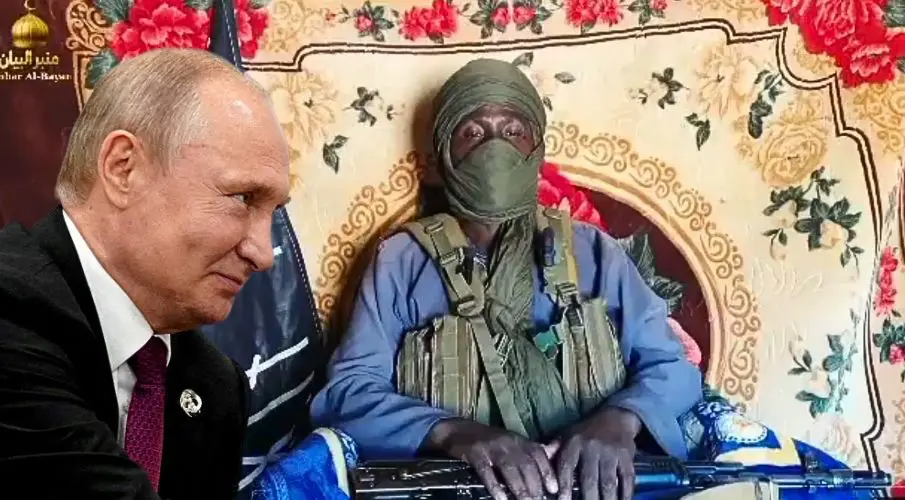
Mali is on the verge of losing a military government that has relied for years on Russian mercenaries, Russian weapons and Russian backing. Exactly where the Kremlin believed it could cement its influence on the continent for decades, Moscow is now losing control as Al-Qaeda cuts the capital Bamako off from the outside world and grinds the state down with a system of blockades, ambushes and extortion. The uprising follows no classic frontline. It follows the fuel trucks. Every stopped delivery is a blow to a junta that has found no way for months to keep the country together.
Mali’s leader Assimi Goïta owes his position to two coups - one that made him vice president, and a second in which he deposed his former superior and declared himself president. Russia never minded this background. On the contrary, a man without a mandate, isolated from Europe and entangled in internal power struggles, was an ideal partner. Moscow offered soldiers, money and political protection, and in return Mali was to open its resources - gold, uranium, lithium. The Wagner mercenaries, later folded into the so-called African Corps of the Russian Defense Ministry, operated like a mix of private army and resource company. But this alliance also began to crumble. Goïta transferred large sums to Moscow while at the same time holding back mining concessions to secure income for himself. The relationship cooled noticeably before it collapsed.
Russia and Mali had signed an agreement on nuclear cooperation and other accords in June 2024. The occasion was the visit of Mali’s head of state Colonel Assimi Goïta to the Kremlin, where he met President Vladimir Putin on Monday.
Meanwhile, attacks by groups aligned with Al-Qaeda intensified. They bypassed the army, Russian military support and all checkpoints - and systematically cut Bamako off from fuel. What began as the junta’s attempt to control rural regions through gasoline rationing turned into its opposite: motorcycle units and pickup trucks now ambush fuel tankers, destroy shipments or divert them. The capital survives only on rare convoys escorted by the military. A liter of gasoline now costs more than a monthly salary. Prices for food and medicine have exploded. Western countries have evacuated their diplomats. The city is practically under siege.
The Russian mercenaries who were supposed to stabilize Mali are no longer fighting. Moscow halted offensive operations and patrols after Goïta refused to grant additional resource rights. Only the construction of a joint gold refinery - 62 percent Malian, 38 percent Russian - brought movement back into the relationship. But the project exists only on paper. No one knows whether it will ever begin operating. The reality looks different: the Russia backed government controls only Bamako and a few gold mining areas. The rest of the country is slipping away, village by village.
The jihadists are exploiting this vacuum. They attack across Mali, push into Nigeria, earn money from gold, smuggling and kidnappings. They openly call on the population to rise up against the government. The junta responds with suspicion, raids and blame shifting - but not with solutions. That parts of the rural population support Al-Qaeda is not only about ideology but also about fear of army operations that in previous years were accompanied by Russian mercenaries and escalated brutally in many regions.

Jama’at Nasr al-Islam wal-Muslimin is Al-Qaeda’s branch in Africa
The picture is clear: a regime that made itself dependent on Moscow is close to losing its capital. And if Bamako falls, the gold mines will end up in the hands of Al-Qaeda - a nightmare for anyone who believes jihadists can be contained by force alone. Neither Russia nor Mali’s leadership has shown it can handle the situation. On the contrary, the Russian presence has intensified conflicts, deepened mistrust and weakened the army. The decision to rely on mercenaries rather than a functioning political system is now backfiring.
If the junta remains powerless, Mali could face a third coup. But who still believes in that solution? Perhaps a government that tries to bargain with Al-Qaeda: peace in exchange for resources. But Mali’s history shows how hopeless that path is. Anyone who pays extremists strengthens them. Anyone who gives them land loses their own. Mali stands at an abyss many saw coming and no one stopped. And for the Kremlin, which wanted to present itself as Africa’s new protector, this abyss has now become its own.
Updates – Kaizen News Brief
All current curated daily updates can be found in the Kaizen News Brief.
To the Kaizen News Brief In English